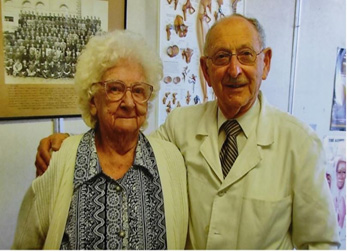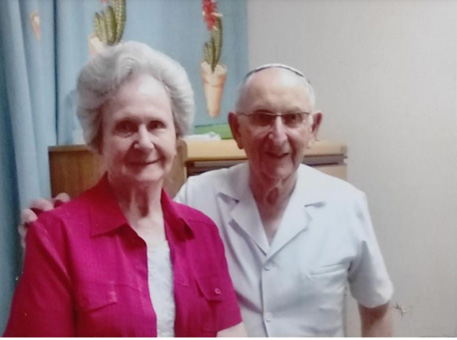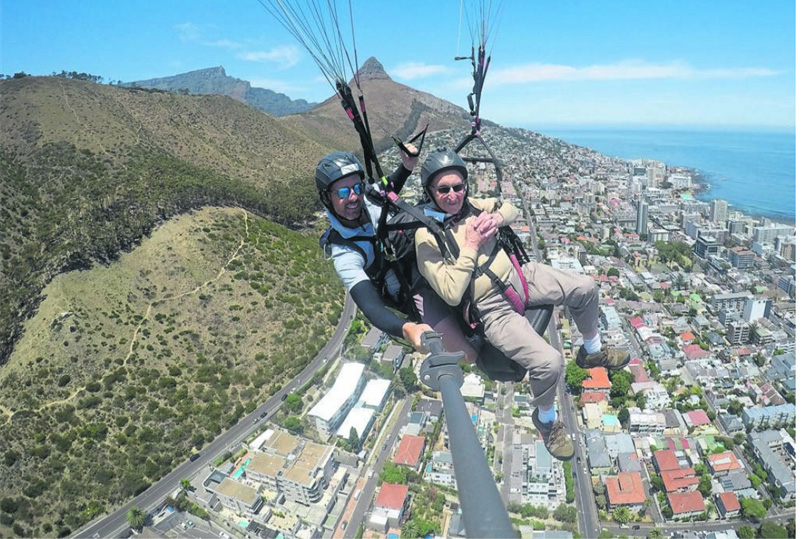
I was born in Cape Town in 1930 and grew up in Muizenberg. I studied Medicine at UCT and qualified in 1951.
After completing 18 months of internship at Groote Schuur Hospital and the Peninsula Maternity Hospital, I joined Dr Nathan Mallach in Goodwood in 1954 as an assistant.
However, there were 2 conditions of employment: (1) There was no possibility of future partnership in the practice and (2) I had to be married because when I was on night duty and over the weekends, my wife would have to take the telephone calls.
Since I was engaged to Chana at the time, we had to make wedding arrangements within a month so that I could take up the position. My salary was ninety pounds per month plus free accommodation in the house adjoining Dr Mallach's home and surgery.
Working hours were 7.30 -18.30 and I was on duty four nights per week and was not allowed to leave the area as I had to attend calls that came in. I was alone on duty every alternate weekend.
Patients had difficulty in pronouncing my name and I was on occasions called 'Dr Oorlog' and one patient even referred to me as Dr Mallach se 'agterryer'(the nog schleper).

In the early years, the consulting rooms were open from 8:30am until 11pm at night. House calls were numerous (day and night), sometimes up to 10-15 per day. Most patients did not have telephones and the only way to contact the rooms was by public telephone. It was common to hear the receptionist shouting: 'Put your tickey in,' so that the call could be connected. A tickey had the value of 3 pence which was the cost of a 3-minute telephone call.
After 19.30 on the nights I was on duty, the phonecalls were put through to my home. In later years, when pagers were introduced, patients would phone the night service, which would then relay the call to my beeper.
After 3 years as an assistant, I felt I needed more security and Nathan Mallach agreed to sell me a small portion of the practice. As the practice grew, Oscar Segal, Lennie Muller and Norman Marcus became partners too.
We sold the practice after 54 years in Goodwood. My partners retired, but I wasn’t yet 'tired,' so I joined a practice in Bellville, where I continued for another ten years. When COVID was unleashed on the world in early 2020, my principal deemed it wise for me to not be exposed to potential Coronavirus because of my age and at that stage I formally retired from practice.
All the doctors in Goodwood were Jewish with the exception of Doctor Needham who was the Railway doctor.
Other practices in Goodwood were Solly Smiedt with Gerald Budow and Dave Michaelson; Dave Sapperson replaced him after he left.
Bernie Wortreich had Issy Brenner as an assistant. Morris Friedman had Joe Smith followed by Max Poliack and later by Joe Poliack. Julius Helman practiced on his own. Prior to my joining Nathan Mallach, Larzie Lichtenstein and Barney Kahanowitz were his assistants.
The local pharmacists were Hymie Cotton, Charlie Jacobs and Leslie Linde. Benny Cohen was our local dentist and also the chairman of the Goodwood Shul which was built in 1950. Morris Beilinson later took over his practice.
In all, we were 37 Jewish families and those who weren't in the health professions had businesses in Goodwood. During the 60s, both Nathan Mallach and Solly Smiedt were active in Goodwood municipal affairs and each in his own time became Mayors of the town.
From about the mid-60s, some of the senior Goodwood doctors emigrated to Israel with their families.
They were Dr Bernie Wortreich, Dr Max Poliack, Dr Morris Friedman and Dr Bennie Cohen.
In Israel, Dr Max Poliack was very much involved in the Family Practice Program, Dr Bernie Wortreich worked with people with disabilities, Dr Morris Friedman became an anaesthetist, and Dr Benny Cohen had a dental practice in Kfar Shmaryahu.

For those of us who were left in Goodwood, practice was indeed 'family practice,' dealing above all else with trauma, pregnancies and confinements, psychiatric and psychological problems, and many social issues, as well as assisting at operations.
Reverend Dorogow was the shochet for the Cape Town community and also spent time leading the Goodwood community in religious services. After his untimely death in the early '60s, Reverend Jossie Klitzner assumed leadership of the community in religious services. He taught our children their Hebrew studies, and he also performed shechita duties for greater Cape Town.
